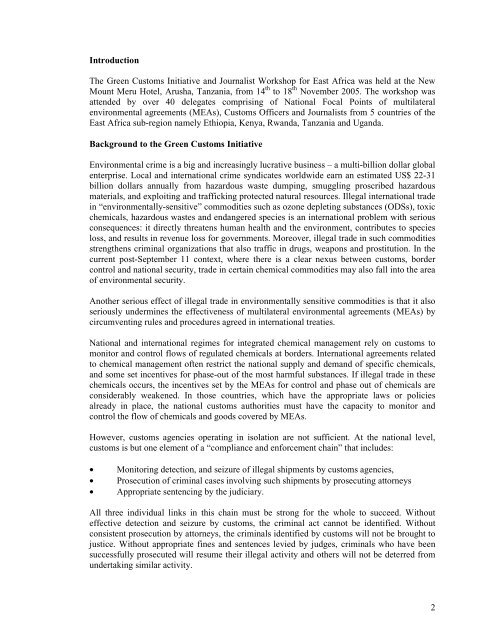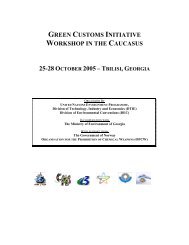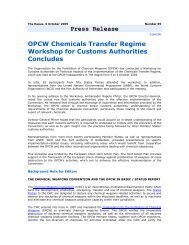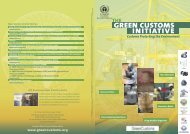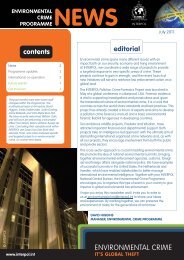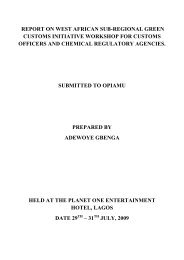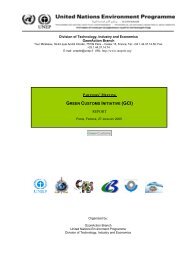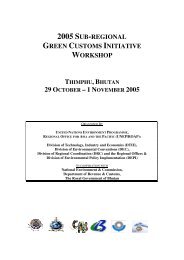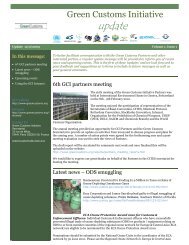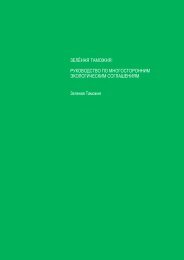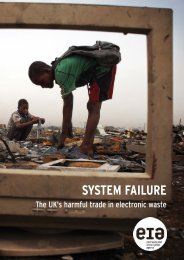Arusha - Green Customs Initiative
Arusha - Green Customs Initiative
Arusha - Green Customs Initiative
You also want an ePaper? Increase the reach of your titles
YUMPU automatically turns print PDFs into web optimized ePapers that Google loves.
Introduction<br />
The <strong>Green</strong> <strong>Customs</strong> <strong>Initiative</strong> and Journalist Workshop for East Africa was held at the New<br />
Mount Meru Hotel, <strong>Arusha</strong>, Tanzania, from 14 th to 18 th November 2005. The workshop was<br />
attended by over 40 delegates comprising of National Focal Points of multilateral<br />
environmental agreements (MEAs), <strong>Customs</strong> Officers and Journalists from 5 countries of the<br />
East Africa sub-region namely Ethiopia, Kenya, Rwanda, Tanzania and Uganda.<br />
Background to the <strong>Green</strong> <strong>Customs</strong> <strong>Initiative</strong><br />
Environmental crime is a big and increasingly lucrative business – a multi-billion dollar global<br />
enterprise. Local and international crime syndicates worldwide earn an estimated US$ 22-31<br />
billion dollars annually from hazardous waste dumping, smuggling proscribed hazardous<br />
materials, and exploiting and trafficking protected natural resources. Illegal international trade<br />
in “environmentally-sensitive” commodities such as ozone depleting substances (ODSs), toxic<br />
chemicals, hazardous wastes and endangered species is an international problem with serious<br />
consequences: it directly threatens human health and the environment, contributes to species<br />
loss, and results in revenue loss for governments. Moreover, illegal trade in such commodities<br />
strengthens criminal organizations that also traffic in drugs, weapons and prostitution. In the<br />
current post-September 11 context, where there is a clear nexus between customs, border<br />
control and national security, trade in certain chemical commodities may also fall into the area<br />
of environmental security.<br />
Another serious effect of illegal trade in environmentally sensitive commodities is that it also<br />
seriously undermines the effectiveness of multilateral environmental agreements (MEAs) by<br />
circumventing rules and procedures agreed in international treaties.<br />
National and international regimes for integrated chemical management rely on customs to<br />
monitor and control flows of regulated chemicals at borders. International agreements related<br />
to chemical management often restrict the national supply and demand of specific chemicals,<br />
and some set incentives for phase-out of the most harmful substances. If illegal trade in these<br />
chemicals occurs, the incentives set by the MEAs for control and phase out of chemicals are<br />
considerably weakened. In those countries, which have the appropriate laws or policies<br />
already in place, the national customs authorities must have the capacity to monitor and<br />
control the flow of chemicals and goods covered by MEAs.<br />
However, customs agencies operating in isolation are not sufficient. At the national level,<br />
customs is but one element of a “compliance and enforcement chain” that includes:<br />
• Monitoring detection, and seizure of illegal shipments by customs agencies,<br />
• Prosecution of criminal cases involving such shipments by prosecuting attorneys<br />
• Appropriate sentencing by the judiciary.<br />
All three individual links in this chain must be strong for the whole to succeed. Without<br />
effective detection and seizure by customs, the criminal act cannot be identified. Without<br />
consistent prosecution by attorneys, the criminals identified by customs will not be brought to<br />
justice. Without appropriate fines and sentences levied by judges, criminals who have been<br />
successfully prosecuted will resume their illegal activity and others will not be deterred from<br />
undertaking similar activity.<br />
2


